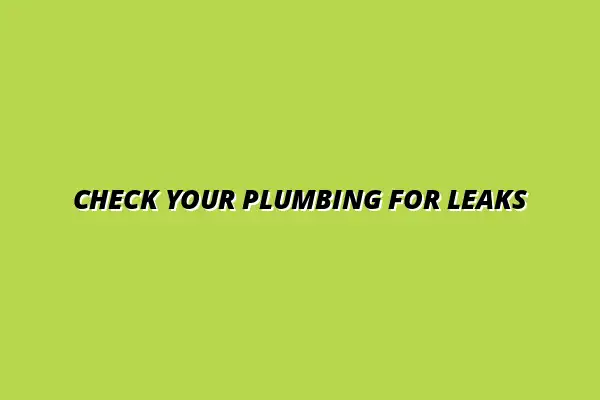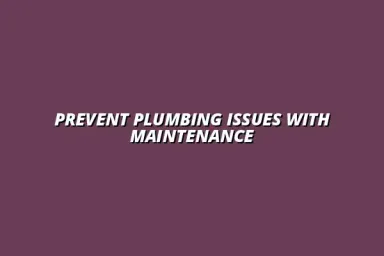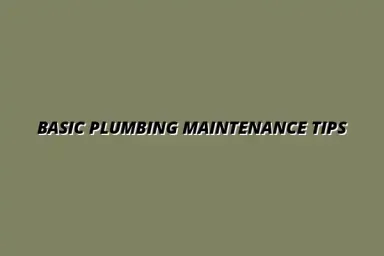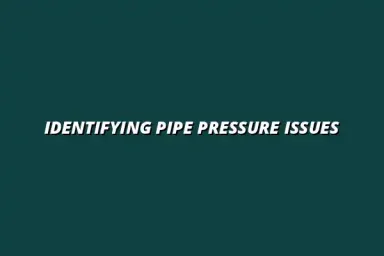Understanding the Significance of Routine Plumbing Inspections
When we think about home maintenance, one crucial aspect often gets overlooked — plumbing. It plays a vital role in our daily lives, affecting everything from drinking water quality to waste disposal. A well-functioning plumbing system is key to ensuring that our homes are comfortable and free from unexpected disruptions!
Without reliable plumbing, you might experience issues like low water pressure, slow drainage, or even complete outages. This can lead to frustration and can disrupt everyday activities like cooking, cleaning, and bathing. It's clear that taking care of our plumbing is essential for a smoothly running household. Regular maintenance, including inspecting your essential plumbing maintenance, is key to preventing costly repairs.
The Role of Plumbing in Home Maintenance
Plumbing is more than just pipes and fixtures; it’s the backbone of our home’s functionality. Regular plumbing inspections can help identify potential problems before they escalate. Here are some key roles plumbing plays in maintaining your home:
- Provides access to clean water for drinking, cooking, and hygiene.
- Ensures proper waste removal, keeping your home sanitary.
- Contributes to overall property value through well-maintained systems.
By keeping an eye on your plumbing system, you can save yourself from costly repairs and ensure a better quality of life at home. Routine inspections should be an integral part of your home maintenance schedule!
Consequences of Ignoring Plumbing Leaks
Ignoring plumbing leaks can lead to serious consequences that affect both your home and health. Water damage can quickly escalate, leading to costly repairs and potential structural issues. Here are some consequences of neglecting those pesky leaks:
- Structural Damage: Leaks can weaken walls, ceilings, and floors over time.
- Increased Costs: Small leaks can lead to higher water bills, draining your finances.
- Health Risks: Damp areas can promote mold growth, posing health risks to your family.
Being proactive about plumbing inspections helps you avoid these risks and keeps your home a safe haven. For example, regular drain inspections can prevent costly backups and repairs. It's much easier to fix a small issue than to deal with the fallout from a significant plumbing failure!
Recognizing Common Signs of Plumbing Leaks
Identifying plumbing leaks early can save you from future headaches! Knowing what signs to look for is key to maintaining your plumbing system. There are several visual indicators that can signal a problem.
Keep an eye on wet spots, water stains, or unexpected puddles around your home. If you notice any of these signs, it might be time to investigate further!
Visual Indicators of Plumbing Issues
Visual inspection is an essential part of maintaining your plumbing system. Here are some common signs that indicate a leak might be present:
- Water stains on walls or ceilings.
- Mold or mildew growth in bathrooms or basements.
- Damp patches or puddles on floors.
These visible indicators should prompt you to check your plumbing system and possibly schedule a professional inspection. Learning how to detect hidden pipe leaks can save you significant money and stress in the long run. Remember, catching these signs early can save you time and money!
Unusual Sounds and Smells
Have you ever heard strange sounds coming from your pipes? Unusual noises can indicate plumbing leaks that need immediate attention. Listen for sounds like dripping, gurgling, or hissing, as they may point to underlying issues. Regular bathroom plumbing inspections are especially important for identifying these subtle clues.
Additionally, strange smells can also be a sign of trouble. Here are some sounds and smells to be aware of:
- Dripping: Continuous dripping may indicate a leaky faucet or pipe.
- Hissing: This could signal a leak in your plumbing system.
- Musty Odor: This may suggest mold growth due to hidden leaks.
Don’t ignore these signs! They can help you catch plumbing issues before they turn into major problems. Stay alert and proactive about your plumbing maintenance!
Best Practices for Identifying and Fixing Plumbing Leaks
Tools and Techniques for Homeowners
Detecting plumbing leaks is crucial for maintaining a healthy home environment. As a homeowner, having the right tools and techniques at your disposal can make a significant difference. Here are some essential tools that can help you identify leaks:
- Plumbing Snake: Useful for clearing clogs that may contribute to leaks.
- Moisture Meter: Measures moisture levels in walls and floors to pinpoint damp areas.
- Pipe Inspection Camera: Allows visual inspection of pipes without invasive techniques.
- Water Pressure Gauge: Tests water pressure to detect potential leaks in the system.
In addition to tools, familiarizing yourself with basic techniques can be highly beneficial. Regular water pipe cleaning can also help prevent future issues. For instance, regularly checking your water meter can help you notice unexpected changes, which may indicate hidden leaks. Make it a habit to inspect areas around your appliances and under sinks for any signs of moisture or corrosion.
Steps to Take When a Leak is Found
Finding a leak can be stressful, but knowing what to do next can help minimize damage. Here are the immediate actions you should take:
- Shut Off the Water Supply: Locate the main shut-off valve and turn it off to prevent further water flow.
- Drain the Pipes: Open taps around the house to allow remaining water to drain out.
- Assess the Damage: Inspect the area to determine the extent of the leak and any damage caused.
- Call a Professional: If the leak is significant or difficult to repair, contact a plumbing expert for assistance. For example, a plumber in Great Barr, Birmingham can provide expert help. Find a local plumber using online resources like this plumbing company.
Following these steps can help you act quickly, minimizing both damage and repair costs. Remember, addressing leaks promptly is key to preserving your home’s plumbing system.
Frequently Asked Questions About Plumbing Leaks
What Are the Most Common Causes of Plumbing Leaks?
Understanding the common causes of plumbing leaks can help you prevent them. Here are some of the most frequent culprits:
- Worn out seals: Over time, seals in faucets and fixtures can wear out, leading to leaks.
- Corroded pipes: Aging pipes, especially those made of metal, can corrode and develop leaks.
- High water pressure: Excessive water pressure can put stress on pipes, causing them to burst or leak.
- Improper installation: If plumbing fixtures are not installed correctly, it can lead to leaks down the line.
By being aware of these causes, you can take preventive measures and maintain your plumbing system more effectively. Regular maintenance, such as preventing water heater leaks, is crucial.
How Often Should I Check My Plumbing for Leaks?
Regularly checking your plumbing is essential to avoid major issues. Here are some guidelines on how often you should perform these checks:
- Quarterly: Conduct a general inspection of visible pipes and fixtures every three months.
- Seasonally: Before winter or after heavy rainfall, check for leaks that might have developed due to temperature changes or ground saturation.
- Before Major Events: If you're hosting a gathering or planning a vacation, inspect your plumbing to avoid any surprises.
By sticking to a regular inspection schedule, you can catch potential leaks before they become significant problems, saving you time and money in the long run.
Long-Term Benefits of Regular Plumbing System Checks
Maintaining Property Value Through Good Plumbing
Keeping your plumbing system in check is vital for maintaining your home’s value. Regular inspections ensure all components are functioning correctly and reduce the likelihood of major repairs that could deter potential buyers. A well-maintained plumbing system enhances your home's appeal and can be a selling point if you choose to move.
Moreover, visible signs of neglect can lead to lower offers from buyers, as they may factor in future repair costs. Thus, keeping up with inspections can protect your investment and potentially increase property value over time.
Encouraging Sustainable Water Usage Practices
By identifying and fixing leaks promptly, homeowners contribute to more sustainable water usage practices. It’s not just about saving money; it’s also about conserving our precious water resources. Fixing leaks can significantly reduce your household water consumption, which is beneficial for both your wallet and the environment.
- Environmental Impact: Preventing leaks helps reduce water waste, benefiting local ecosystems.
- Cost Savings: Fixing leaks leads to lower water bills, allowing you to save money.
- Community Awareness: Promoting good practices can inspire neighbors to do the same, creating a more water-conscious community.
Embracing these practices not only aids in personal savings but also fosters a collective responsibility towards sustainable water usage.
Final Thoughts on Plumbing Leak Prevention and Maintenance
The Importance of Proactive Care for Home Plumbing
Regular plumbing inspections are crucial for maintaining a healthy home. They help identify issues before they escalate into costly repairs. By being proactive, you can ensure that your plumbing system runs smoothly, providing comfort and safety for you and your family.
Moreover, staying on top of maintenance can give you peace of mind knowing that your home is in good shape. Remember, an ounce of prevention is worth a pound of cure!
Encouraging Action for Homeowners
I encourage all homeowners to take action today! Start implementing regular plumbing checks and stay vigilant for any signs of trouble. Don't hesitate to reach out to professional plumbing services for a thorough inspection when needed.
By being proactive about plumbing maintenance, you protect your home, your finances, and the environment. Let's make plumbing care a priority — your home will thank you!

 Kiran Almasi
Kiran Almasi

